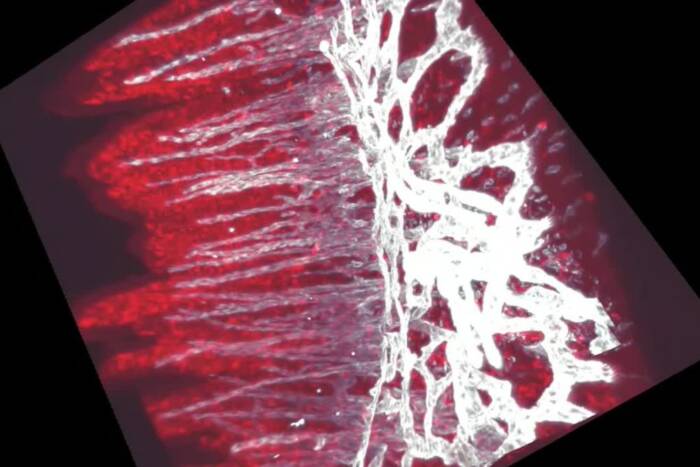Environmental health and safety program wins award
by TALLEY HENNING BROWN

On the safe side. The Office of Laboratory Safety and Environmental Health, from left to right: James Gugluzza, Amy Wilkerson, Anthony Santoro, Rebecca Lonergan, Frank Schaefer, Anthony Harper, Gaitree McNab, Beth Fitzgerald and Elsie Calo.
Probing the depths of human disease often means being up close and personal with hazardous materials. Even so, Rockefeller University has been named one of the safest campuses in the country. In New Orleans this July, Amy Wilkerson, associate vice president for research support, accepted on behalf of The Rockefeller University an Award of Honor from the Campus Safety, Health and Environmental Management Association (CSHEMA). One of only two such awards conferred this year, the honor recognizes the university’s comprehensive safety program.
Established in 1954, CSHEMA is the leading professional environmental health and safety organization for the college and university sector. As part of its mission to encourage creative problem solving and address emerging health and safety challenges among member institutions, CSHEMA instituted its awards program in 1972. Applicant institutions are evaluated on a point system; the Award of Honor, which requires a score of 90 percent or higher, is CSHEMA’s highest. Rockefeller University, a member since the early 1980s, applied for the first time this year.
In a nutshell — the instructions for the award application comprise 13 pages — CSHEMA looks for proof that a comprehensive environmental health and safety program is in place and covers and supports all members of the applying institution; that the program addresses all government regulations and issues particular to the institution; and that the policies are adequately enforced and measurably successful in achieving their stated goals. Additionally, CSHEMA requires proof that an appropriate level of resources is devoted to environmental health and safety issues. The application process is essentially a detailed internal audit followed by an external audit by the award committee. In many ways, this combination of internal and external audits is analogous to how universities review other programs, such as financial systems.
Award applicants shoulder a heavy burden of proof because campus safety involves more than just protective clothing in the lab and round-the-clock security detail. As the thousand-plus pages of Rockefeller’s CSHEMA application show, every detail from the type of seal used on a centrifuge to how to handle an aerosol can to what may or may not be poured down a drain is important in maintaining a safe workplace for employees. Furthermore, the expanding climate of ecological consciousness and the increasingly complicated governmental regulations circumscribing research institutions have created a situation that requires sophisticated tools and regulatory expertise to navigate. The university’s approach to all of these issues was spelled out by the team led by Ms. Wilkerson and Laboratory Safety and Environmental Health Associate Director Frank Schaefer, who compiled information on how the university addresses injuries and illness, fire and life safety, environmental management, biological safety, radiological safety, chemical safety, government relations and emergency preparedness.
“To win the award, the university had to demonstrate not only that we have the right policies,” says Ms. Wilkerson, “but that we actually implement them, provide training and guidance, that our personnel work safely and that we are an environmentally conscious community.”
The completed application, which went to CSHEMA in February, took several months to compile and involved collaborative efforts by LS&EH, the Comparative Bioscience Center, Financial Administration, Food Services, the hospital, Human Resources, Occupational Health Services, Planning and Construction, Plant Operations and Security.
“This was a great effort for us on many levels and it also gave us the opportunity to do our own audit of our whole program,” says Beth Fitzgerald, assistant to the associate vice president for research support and the main point person on the CSHEMA application. “To have a jury of your peers tell you you’re doing a great job is even better.”


